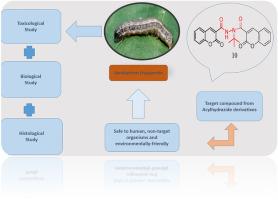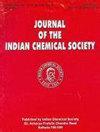功能化羧酰肼:一些新的羧酰肼衍生物的合成、杀虫评估、针对鞘翅目蚜虫的生物学和组织学研究
IF 3.2
4区 化学
Q2 CHEMISTRY, MULTIDISCIPLINARY
引用次数: 0
摘要
秋绵虫是许多具有重要经济价值的养殖业的主要害虫。目前,大部分的秋刺吸虫防治工作仍然是通过使用转基因植物和人工化学品来完成的,而这两种方法都有可能对目标动物产生负面影响。为了在生态友好原则的基础上进一步提高杀虫活性,我们合成了十种新型羧酰肼衍生物,并评估了它们对第二和第四龄幼虫的杀虫性能。我们使用了多种光谱技术来验证新开发产品的结构完整性。目标化合物 10 的活性最高,对第二龄幼虫的半致死浓度为 2.14 毫克/升,对第四龄幼虫的半致死浓度为 15.33 毫克/升。此外,还研究了示范化合物的一些生物学和组织学特征。这项工作为羧酰肼化合物的生产提供了新的见解,并进一步支持了对节肢动物的抗增殖作用。本文章由计算机程序翻译,如有差异,请以英文原文为准。

Functionalized carbohydrazide: Synthesis, insecticide evaluation, biological and histological studies of some new carbohydrazide derivatives against Spodoptera frugiperda
Fall armyworms, or Spodoptera frugiperda, are a major pest for numerous economically significant cultures. The majority of S. frugiperda control is still accomplished through the use of genetically modified plants and artificial chemicals, both of which have the potential to negatively impact no target animals. In order to further improve the insecticidal activity based on eco-friendly principles, we synthesized ten novel carbohydrazide derivatives and evaluated their insecticidal performance against S. frugiperda larvae in their second and fourth larval instars. A number of spectroscopic techniques, were used to verify the newly developed products' structural integrity. Target compound 10 was the most active, with an LC50 of 2.14 mg/L for 2nd instar larvae and 15.33 mg/L for 4th instar larvae. In addition, some biological and histological characteristics of the demonstration compounds were also investigated. This work provides new insights into the production of carbohydrazide compounds and further supports the anti-proliferation of S. frugiperda.
求助全文
通过发布文献求助,成功后即可免费获取论文全文。
去求助
来源期刊
CiteScore
3.50
自引率
7.70%
发文量
492
审稿时长
3-8 weeks
期刊介绍:
The Journal of the Indian Chemical Society publishes original, fundamental, theorical, experimental research work of highest quality in all areas of chemistry, biochemistry, medicinal chemistry, electrochemistry, agrochemistry, chemical engineering and technology, food chemistry, environmental chemistry, etc.

 求助内容:
求助内容: 应助结果提醒方式:
应助结果提醒方式:


